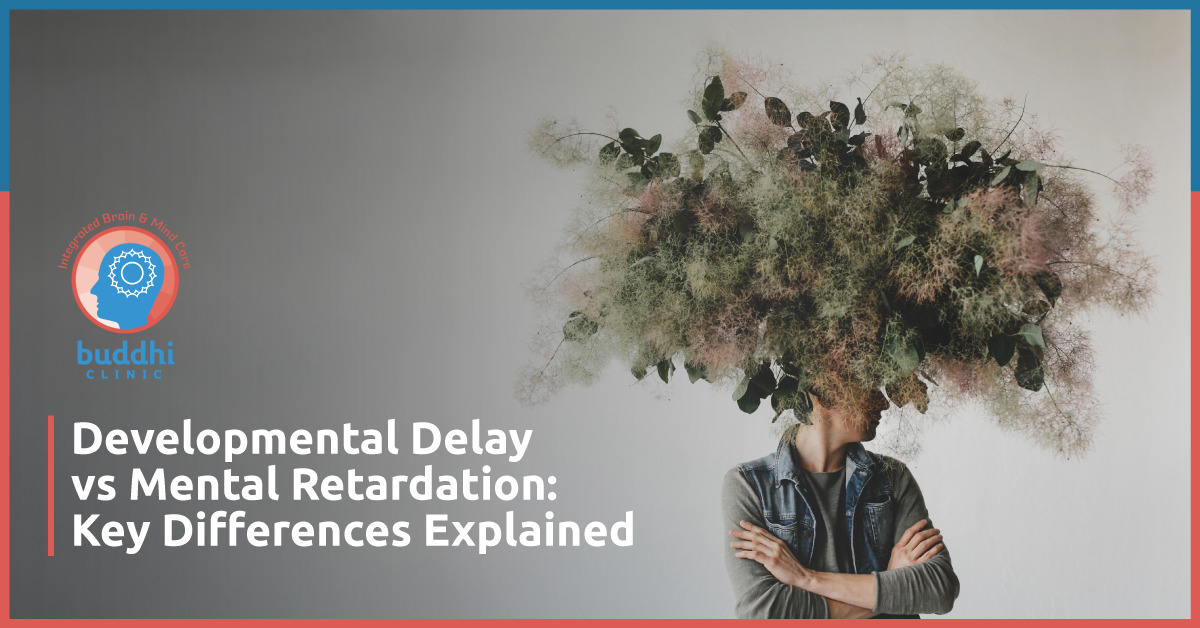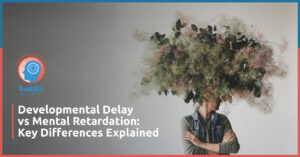Introduction
It is crucial to understand the difference between developmental delay vs mental retardation for early intervention and treatment. While both are used to describe an impact on cognitive, social, and motor abilities, they vary in severity, permanence, and the treatment approach.
Developmental delays are also often transient, and with therapy and support, children can catch up with their peers. Mental retardation (intellectual disability) is a permanent state that will require specialised care to foster adaptive living and independence.
The following is the most essential differentiation between developmental delay vs mental retardation, their causation, symptoms, and why Buddhi Clinic is the best place for neurodevelopmental treatment.
What Is Developmental Delay?
Developmental delay is slower-than-predicted development towards the attainment of developmental milestones in speech, motor, social interaction, and cognitive functioning.
Causes of Developmental Delay
- Genetic Factors : Down syndrome or Fragile X syndrome.
- Prenatal Issues : Maternal exposure to toxins, infections, or nutritional deficiencies during pregnancy.
- Birth Complications : Premature delivery or low birth weight.
- Environmental Factors : Inadequate stimulation, neglect, or improper nutrition.
Signs of Developmental Delay
- Language & Speech Delay : Difficulty in creating words or sentences.
- Motor Skill Difficulty : Difficulty with crawling, walking, or fine motor skills.
- Emotional & Social Delays : Difficulty interacting with people or expressing feelings.
- Cognitive Delays : Difficulty in problem-solving and learning new concepts.
Buddhi Tip: Speech therapy, occupational therapy, and early intervention through behavior intervention will help children make up for lost developmental milestones.
What Is Mental Retardation (Intellectual Disability)?
Mental retardation, or intellectual disability as it is presently referred to, is a neurodevelopmental condition which has a significant impact on intellectual functioning and adaptive behavior.
Causes of Intellectual Disability
- Genetic Disorders : Down syndrome, Rett syndrome, or metabolic disorder.
- Brain Injury : Trauma at birth or accidents during childhood.
- Prenatal Exposure : Maternal exposure to alcohol, drugs, or infection of the fetal brain during development.
- Neurological Disorders : Epilepsy, cerebral palsy, or severe autism spectrum disorder.
Indicators of Intellectual Disability
- SubAverage IQ : Difficulty with reasoning, problem solving, and learning.
- Deficits in Adaptive Behavior : Difficulty performing everyday tasks like dressing, feeding, and communication.
- Social & Emotional Issues : Difficulty forming relationships or understanding social signals.
- Medical Symptoms : Seizures, sensory impairments, or motor impairment.
Buddhi Tip: Structured education programs, life skills training, and specially formulated therapies enable individuals with intellectual disabilities to become independent.
Developmental Delay vs. Mental Retardation: Key Differences Explained
It is extremely important to be aware of the distinction between mental retardation (now referred to as intellectual disability) and developmental delay in order to be able to effectively offer interventions and support. Though both refer to a person’s failure to achieve cognitive, social, and motor milestones, their etiology, presentation, treatment, and prognosis differ greatly.
1. Definition
Developmental Delay:
A state where a child exhibits slower-than-average development in one or more areas of development, such as speech, motor skills, mental capacity, or social interactions. Delayed developments are usually transient, and most kids catch up with others through proper therapy and intervention.
Mental Retardation (Intellectual Disability):
A chronic neurodevelopmental disorder characterised by severe limitations in intellectual functioning and adaptive behaviors. Individuals with intellectual disability generally experience persistent difficulty in reasoning, problem-solving, communication, and self-care that require long-term support.
Buddhi Tip: Delays prior to the age of five are typically referred to as developmental delays, whereas intellectual disability is clinically identified if cognitive impairment is discovered to be long-standing after childhood.
2. Causes
Developmental Delay:
Usually blamed on genetic, prenatal health problems, birth complications, and environmental factors. Some of the typical reasons are:
- Premature birth or low birth weight
- Brain nutrient deficiency
- Lack of stimulation in the early stages of childhood
- Neurological conditions such as autism spectrum disorder
Mental Retardation (Intellectual Disability):
Resulting from genetic diseases, head trauma, or prenatal toxin exposure, leading to permanent intellectual disability. Etiologies may include:
- Down syndrome, Fragile X syndrome, or metabolic disorders
- Prenatal alcohol, drug, or infectious exposure
- Oxygen deprivation caused by injuries at birth
- Traumatic brain injury or catastrophic epilepsy
Buddhi Tip: Identifying the cause in the beginning will set the best treatment approach, whether developmental intervention or a specific education program.
3. Symptoms
Developmental Delay :
Based on the area of development affected, symptoms are but not limited to:
- Speech & language difficulties (Trouble with forming words or sentences)
- Motor skill delay (Struggling to crawl, walk, or manipulate objects)
- Social & emotional immaturity (Difficulty playing with others or knowing about emotions)
- Cognitive processing problems (slowness in problem-solving and learning new facts)
Mental Retardation (Intellectual Disability) :
Individuals exhibit persistent impairments in a variety of areas, such as:
- Low IQ (IQ < 70), which affects reasoning and decision making
- Difficulty learning basic life skills such as dressing, feeding, and grooming
- Social interactions and emotional regulation problems
- Medical conditions, like seizures or compromised senses
Buddhi Tip: While symptoms of developmental delay can be addressed with therapy, intellectual disability requires structured long term support for it to enable independence.
4. Treatment Strategies
Developmental Delay :
Early intervention is emphasised through therapy, education intervention, and developmental activities to accelerate improvement. Treatments include:
- Speech therapy for improving language
- Occupational therapy for enhancing motor skills
- Behavioral therapy for social and emotional skills
- Special education programs to enhance cognitive skills
Mental Retardation (Intellectual Disability) :
Requires lifelong care, with therapy focused on maximising adaptive functioning and not a “cure” for the disorder. Treatment modalities include:
- Structured learning programs with individualised education plans (IEPs)
- Training in life skills in order to become more independent in activities of daily living
- Social therapy for becoming more communicative and relationship-oriented
- Medical management of associated health conditions such as epilepsy or sensory impairments
Buddhi Tip: The sooner the intervention, the better the outcomes are likely to be, whether it’s catching up on developmental milestones or adapting to lifelong challenges.
5. Prognosis & LongTerm Outcomes
Developmental Delay :
Children generally catch up with their peers with proper intervention, therapy, and support of the environment. Although some delays are ongoing, most children who have mild to moderate delays reach age appropriate developmental milestones later in life.
Mental Retardation (Intellectual Disability) :
A long term disorder requiring systemic long term care. While individuals can learn to be independent in some skills, they will often need ongoing assistance with daily living and special education.
Buddhi Tip: Individualised intervention plans allow individuals with intellectual disabilities to learn life skills for maximum independence and quality of life.
Why Buddhi Clinic for Developmental Delay vs Mental Retardation?
1. Neurodevelopmental Expert Care
Buddhi Clinic is a multidisciplinary brain and mind care clinic with integrative neurodevelopmental therapies.
- Experts with Experience : Led by Dr. Ennapadam S. Krishnamoorthy, a specialist in neuropsychiatry.
- Comprehensive Assessments : Latest equipment for accurate diagnoses.
- Personalised Treatment Programs : Tailored therapies to meet individual needs.
2. Holistic & Scientific Approach
Buddhi Clinic combines the latest neuroscience with holistic treatment for holistic care.
- Speech & Occupational Therapy : Improved communication and motor function.
- Behavioural & Cognitive Therapy : Social and emotional development support.
- Alternative Therapies : Neurofeedback, meditation, and yoga for brain stimulation.
3. Long Term Support & Rehabilitation
Buddhi Clinic provides lifetime support to help achieve peak potential.
- Educational Assistance : Specialised learning programs for cognitive enhancement.
- Vocational Training : Independent living skill-building.
- Family Counseling : Parental guidance and counseling.
Buddhi Tip: Buddhi Clinic’s holistic care ensures comprehensive treatment of intellectual and developmental disabilities.
Conclusion
It is critical to know the difference between developmental delay vs mental retardation for early detection and effective intervention. While developmental delay may generally be treated with therapy, mental retardation (intellectual disability) requires ongoing support throughout the lifespan to enhance adaptive functioning.
Buddhi Clinic offers advanced neurodevelopmental therapy, uniting science and natural methods to help individuals reach their full potential. With customized treatment plans, cutting-edge therapies, and extensive rehabilitation, Buddhi Clinic is the go-to choice for developmental and intellectual disabilities.
FAQs
1. Is developmental delay reversible?
Yes! Lots of children catch up to milestones with early intervention and therapy.
2. How is mental retardation diagnosed?
Diagnosis includes IQ testing, adaptive behavior tests, and medical checkups.
3. What therapies assist children with developmental delay?
Speech therapy, occupational therapy, behavioral interventions, and formal learning programs.
4. Can individuals with intellectual disability live independently?
With appropriate training and support, the majority of individuals can be partially or fully independent.
5. Why Buddhi Clinic for neurodevelopmental care?
Buddhi Clinic offers expert led, integrative therapies combining the best of current science with whole-person holistic methods of healing.






